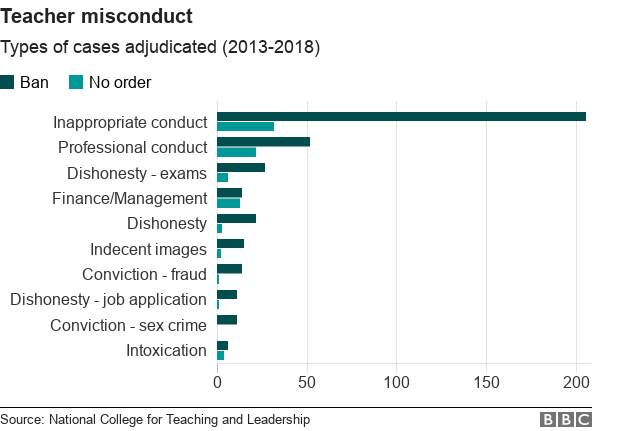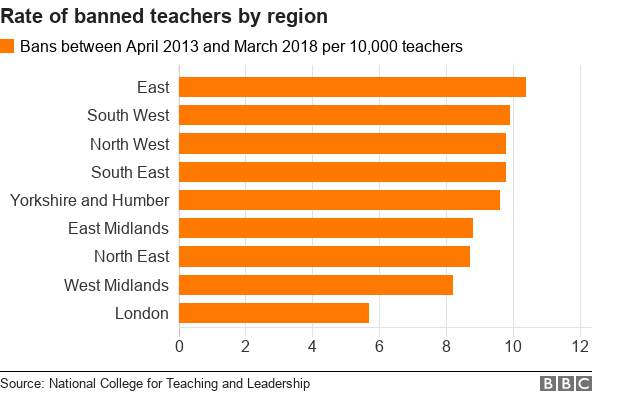Teacher bans: Sexually motivated conduct is most common cause
- Published

"Inappropriate conduct" made up more than half of all bans following misconduct hearings
Sexually motivated, inappropriate conduct is the reason for a third of teaching bans, the BBC has found.
A teacher who measured pupils' penises and another who stole books worth £27,000 are among more than 450 staff across England banned over five years.
Cases included teachers kissing pupils, showing them pornography and sexual relationships.
The National Education Union said the number of bans was "tiny" compared with the 500,000 teachers in schools.
The NSPCC said safeguarding children "must always be a top priority" for schools.
The BBC compiled and analysed National College of Teaching and Leadership (now the Teaching Regulation Agency) judgements between April 2013 and March 2018.
"Inappropriate conduct" made up more than half of all bans following misconduct hearings, with a third of cases having a sexual element.

Where a teacher's subject was specified in the judgement, the BBC's research showed physical education (PE) teachers faced the most investigations, with 23 cases, followed by music (22 cases) and science (21 cases).
Male teachers accounted for about 70% of cases, of which more than half had a sexual dimension, including 10 involving sexual offence convictions and 17 related to indecent images.
Among the 165 female teacher cases, 46 were for dishonesty, 37 for professional misconduct and eight for being drunk at work.
Jerry Glazier, of the NUT section of the National Education Union, said: "We all want children to be safe in our schools and only the best people in the profession."
He said the higher ban rate for male teachers reflected the types of offences committed and the respective threats they posed to students and staff.
One in 10 cases involved head teachers.

What were teachers banned for?
Cases which led to teaching bans include:
London teacher Philip Banwell was banned after calling in sick while he was really away with a pupil for two nights in Brighton, external
Nottinghamshire head teacher Margaret Gretton was banned after referring to special needs pupils as "road kill"
Derbyshire teacher Michael Hall was banned in connection with stealing £180 from someone who had taken their own life, external
Assistant head teacher Andrew Corish was banned after using a mobile phone to film up girl's skirts in Croydon, external
West Sussex teacher Sarah Black claimed 32 days of compassionate leave after claiming her father had murdered her mother, external. Police could find no record of such a crime having taken place.
Ilford primary head teacher Sophie Rahman was banned after allowing London Bridge terrorist Khuram Butt to give after-school classes

Some of the teaching bans involved historical offences, including that of a Rotherham primary school teacher who claimed in the 1970s to be part of a child development study, external.
The teacher - Denis Hays - asked three pupils to attend his home on a monthly basis where he held and measured their various body parts including their genitalia. His activities in the 1970s only came to light in 2015, when it was reported by one of the victims, who had become a police officer. Mr Hays was subsequently dismissed. South Yorkshire Police said no charges had been brought in the case.
Three teachers were banned for racism, two for voyeurism and five for exposing themselves in public.
Thefts accounted for eight cases, including the theft of £27,000 worth of books by Nottinghamshire assistant head teacher Clare Hughes.
Hughes, who was given a two-year suspended sentence in 2016, was only caught after a colleague, seeking to replace a stolen book, discovered Hughes selling the title online.

Clare Hughes stole £27,000 worth of books while working at the Magnus Church of England Academy in Newark, Nottinghamshire
The three-year series of thefts at the Magnus Church of England Academy in Newark harmed learning at the school and put already strained budgets under further stress, head teacher Gill Barker said at the time.
"Colleagues who trusted Clare Hughes had been left feeling devastated, in disbelief and betrayed," she said.

Teachers who were not banned despite misconduct included an art teacher in Hampshire who let two pupils paint using their own blood, external and a head of science at Kelvin Hall School in Hull who failed to report immediately a radioactive substance going missing from a school science lab, external. Kelvin Hall School did not respond to the BBC's questions about whether the radioactive substance was ever recovered.
An NSPCC spokeswoman said: "Safeguarding children must always be a top priority for teaching professionals - school should be a place where young people feel safe and are able to flourish.
"The vast majority of teachers do a fantastic job educating and supporting young people, and are trusted to play a key role in pupils' wellbeing.
"But when issues arise at school, it is right they are dealt with and investigated thoroughly and that the Teacher Regulation Agency continues to take inappropriate conduct very seriously."
The TRA said: "All teacher misconduct cases are rightly judged on an individual basis, using detailed guidance on what is acceptable behaviour for teaching staff."
Geoff Barton, general secretary of the Association of School and College Leaders, said: "Heads will generally make any referral to the TRA with a heavy heart, as they know the consequences for colleagues can be career-ending.
"But heads also know that they act in in loco parentis, and will be driven by a sense of what is ethically right."